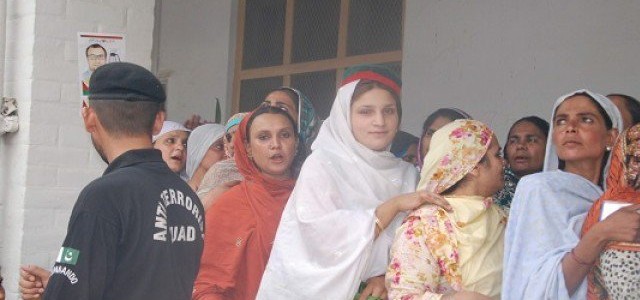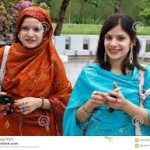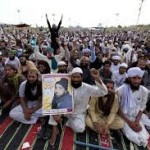Living Pakistan/Candidates in the shadow
Other that sexist propaganda in our regional elections. The women candidates of which I speak have decided not to show their face during the campaign: in place of those husbands, fathers, brothers, who have called on voters to support wives, daughters, sisters. Yet they are candidates and ran a big risk.
This is not a joke, this is the Khyber Pakhtunkhwa, beauty, alias KP, the most “mangy” province of Pakistan, politically won in 2013 by the former cricketer Imran Khan, who with his party PTI (Pakistan Tehreek-e-Insaf) is creating problems the central government. A liberal man, or at least he says so. And the province of the Taliban, with its capital Peshawar, that is the overhead bridge with Afghanistan, where there are also exchanges weapons, drugs, terrorists and hostages. So far from other cultures, which even the starting of Ramadan does not respect what the rest of the country does. To understand and explain who is a Pashtu not just an encyclopaedia should be enough.
The fact is that after the national elections of 2013 and after ten years of lack, last week end were held the Provincial elections in KP, 7th of May the ones in those districts. To date there are 11 dead and 62 wounded policemen and election staff, not really a quiet atmosphere it seems. As always, women were paying the highest price. For several days the press has spoken of the Lower Dir district (240,000 people eligible to vote, 190,000 women), where the Islamist party JI (Jamaat-I-Islami) has “discouraged” women from exercising a right guaranteed by the constitution, backed by jirga (traditional local council). Among the reasons for the prohibition: promiscuity prohibited between the sexes (means no to different cabins in the same seat), the absence or almost separate polling stations for women.
The numbers are as always a comfort and help to understand what leaves many (even here in Pakistan) speechless. In the years prior to 2013, the proportion of seats reserved for women in the local Parliament was lowered from 15 to 11%, reaching 33% for the Parliament elections, due to the pressures of PTI and JI: the latter has pushed hard for women’s participation elections in the province of Sindh (Karachi capital) but did stop it in KP. Easy to imagine why: where there are conservatives repress women’s rights, where there are innovators is encouraged, a vote is still a vote, come on. Also in Lower Dir, the PK95 district had only two seats for women; in that of Kayal no woman was candidate; in that of Adenzal seats for women were “squatted” by candidates of the opposite sex; in the whole province out of 1,226 seats (396 for women) the parties have presented only 464 female candidates. In general, women’s participation in voting than men is 11% in Sindh and Punjab, 2.5% in KP.
The national associations of observers and many local authorities have presented a joint document calling for the annulment of the elections of May 7 to clear violation of the electoral law and universal human rights as the vote is. EU and UNDP have drawn up a joint document calling to respect the criteria of transparency and participation in the electoral process, as already recommended in the Final Report of the EU after the elections of 2013. The National Electoral Commission (ECP) on the other hand yesterday is known satisfied about the progress of the elections and the performance of the officers involved in the electoral process.
Many more reasons for this violent discrimination: cultural, social and technical.
1. Voter registration. Those of us who observed the election processes for years know that this is a crucial step, which takes place a few months or even time before the vote. In Pakistan the NADRA (National Database & Registration Authority) states that only 60% of women have an identity document against 80% of males; and without it they do not vote, as usual.
2. There are not enough women in the police force to ensure security at the polling stations for women.
3. In general there are not enough seats for those eligible to vote, this clearly contributes to the lack of seats differentiated by sex.
4. In Pakistan, but especially in KP, women are economically dependent on men, then eat and take care of the children are inevitably two needs that dominate the desire to participate in public affairs.
5. In general Pathan culture is the most conservative of the whole country and discrimination against women are so obvious, restrictive and punitive to discourage and self-delegitimize the majority of them, needless to say, together with the very low level education.
The responsibility for this horrible experience can not always be set against the single Province, but must be accepted as a National authority by the whole Parliament; ECP from that body as “neutral” and citizens should be guaranteed a transparent process to exercise their right to vote.
More generally, and talking about my experience of life in the country, it is sad to say but I was not surprised by what has happened in KP. Even in places less oppressive daily life of women seems more and more a strenuous battle to leave the house, get a job, think of themselves as independent human beings, maybe even secularised or at least not stifled by politics and religion, when used as a coercive weapon by people who speak even liberals, who dream of Western fantasies, who have lovers to whom ask absolute fidelity, which prohibit women from leaving home alone even in large cities, to work, who still dream of a harem with internet and 3D screens, but they remain crushed by their own machismo disguised as tradition.








